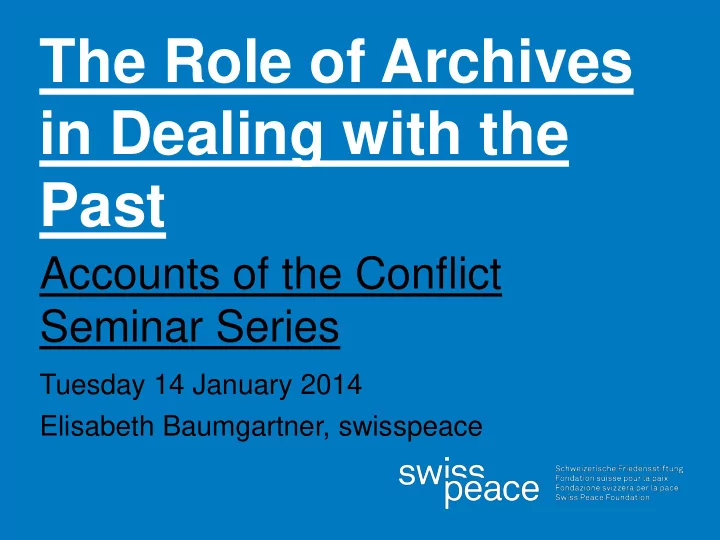

The Role of Archives in Dealing with the Past Accounts of the Conflict Seminar Series Tuesday 14 January 2014 Elisabeth Baumgartner, swisspeace
Right to Know • Right of the victims/society to know what happened • State obligation to preserve the memory of what happened • Avoid manipulation • Avoid reoccurrence of same violations
Right to Know • Missing person commissions • Truth commissions • Investigation commissions • Use of numerous different archives: security forces, municipal, cemeteries, hospitals, land registers etc. • Produce archives which are important sources
Right to Know
7
10
11
Right to Justice Right to Justice • punitive/ retributiv • perpetrator oriented • fair trial principles • no blank amnesties in peace agreements ( for war crimes, crimes against humanity and genocide – “core crimes” ) • National, hybrid, international courts
Right to Justice Right to Justice • International, mixed/hybrid tribunals • National prosecutors, courts • Regional human rights courts ... • often rely on truth, investigation commission reports and files • have special powers to get access: court orders, security council resolutions etc.
17
Exemple 2: Commissions de vérités (et réconciliation)
26
27
28
Right to Reparation Right to reparation • restorative - compensatory • victim oriented • national, international programs (e.g. IOM) • collective – individual • material - symbolic
Right to Reparation Right to reparation • Documentation is needed for victims to claim reparation/compensation/restitution and for claims boards to decide • E.g. lCRC release certificates; prison registres; court files from civil claims; hospital files; medical certificates • Files of other DwP mechanisms: truth commissions, tribunals • TRC archives in Argentina were used for reparation program
Memorialzation - Education Right to reparation • non-recurrence: Nunca Más! • assumption: if you know what happened – if young people understand the mechanisms and personalize the suffering of victims: similar atrocities can be avoided in the future • school curricula; school books; films, educational material, visits to museums, memorials etc.
Symbolic reparation • Museums/documentation centres using archival sources: e.g. Memory Museum in Chile; ICTY/ICTR Information Centres in former Yugoslavia and Rwanda • On-Line Archives: e.g. Memoria Abierta, Argentina • Oral history projects giving victims a voice • Memorials, museums are important for victims, society and future generations
33
http://www.ushmm.org/
35
41
Guarantee of non-recurrence Guarantee of non-recurrence • Archives, documentation centres, memorials, historical places have outreach activities • For different publics • Educational programs • Influence on school curricula
Oral Archives – historical memory work • move societies towards non-violence and no repetition • is the past “dealt with” through top down interventions? (commission, monument, apology) • autonomous, long term, and participatory processes to recover, reclaim and/or find evidence of past violations • placing those who have been traditionally silenced and their knowledge at the center of memory work. 43
44
45
46
47 47
http://www.dealingwiththepast.ch/ http://www.swisspeace.ch/ swisspeace Elisabeth Baumgartner Dealing with the Past Program Sonnenbergstrasse 17 P.O. Box, CH - 3000 Bern 7 Tel. +41 (0)31 330 10 78 Fax +41 (0)31 330 12 13 elisabeth.baumgartner@swisspeace.ch
Recommend
More recommend